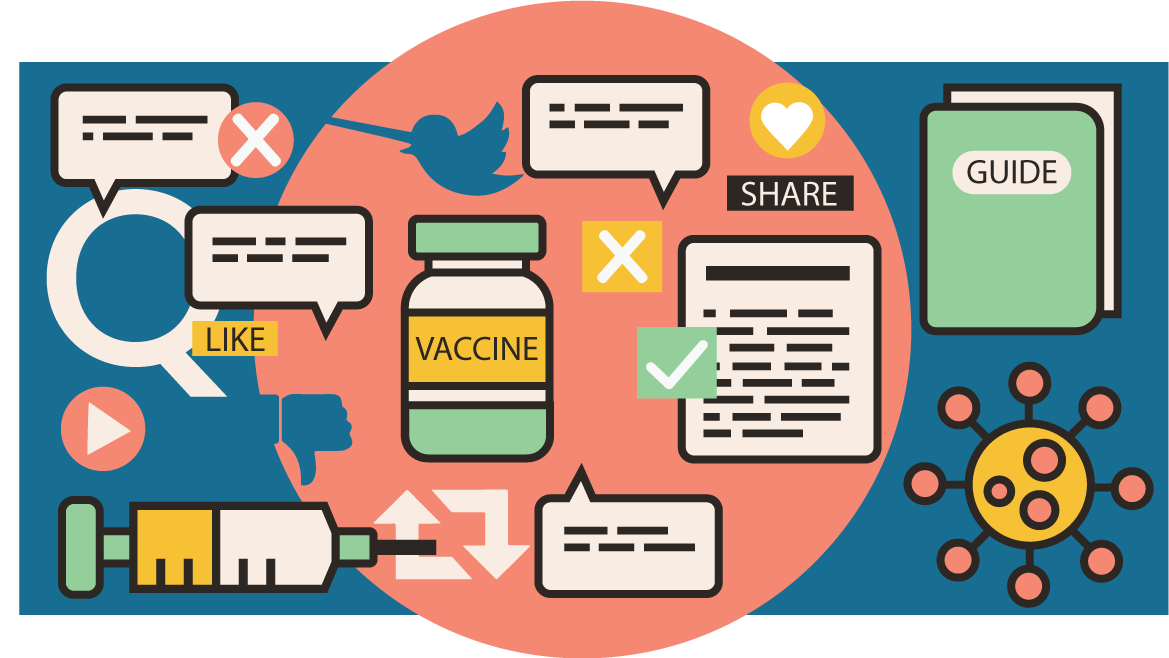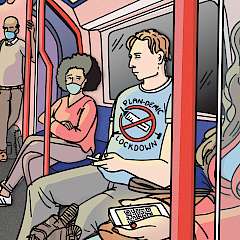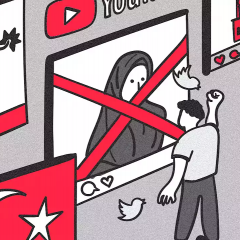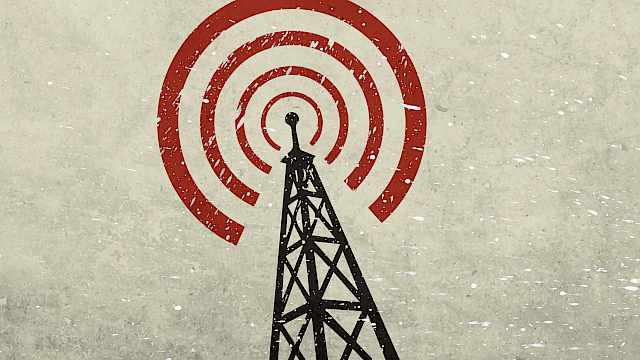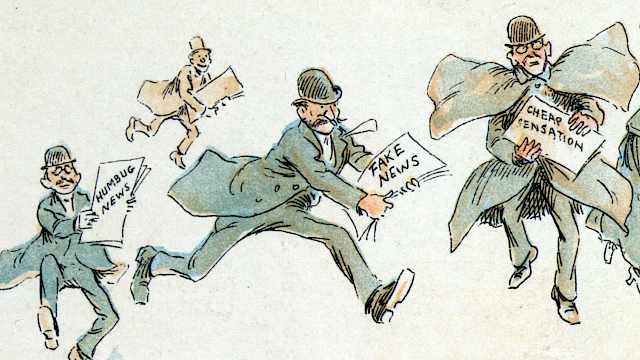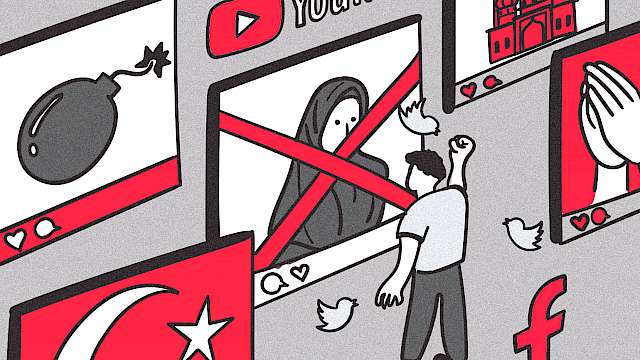The COVID-19 pandemic has changed everything. It has disrupted global travel and the economy, and public health responses to the pandemic have curtailed democratic freedoms to an unprecedented degree in most western countries. The pandemic has also been accompanied by an “infodemic” of misinformation and conspiracy theories. In the UK, around 1 in 4 adults believe in at least one conspiracy theory relating to COVID-19.
In the UK, around 1 in 4 adults believe in at least one conspiracy theory relating to COVID-19.
Conspiracy theories and misinformation have demonstrable adverse consequences because they hinder our ability to respond effectively to a crisis.. For example, exposure to misinformation has been shown to reduce people’s intention to get vaccinated by 6% or more.
Given that widespread vaccination is a key ingredient to help the world recover from the pandemic, the effect of anti-vaccination misinformation is particularly concerning and renders communication about the COVID-19 vaccines – and encouraging vaccine uptake – particularly critical. To assist with this, an interdisciplinary team of more than 25 scientists worldwide has recently published a COVID-19 vaccination communication handbook. The handbook is freely available for download in 11 languages and provides specific hints about how to communicate the benefits of COVID-19 vaccines. It is aimed at all types of practitioners, from physicians and nurses to journalists and people in government, but also the public at large.
Inoculation
One of the techniques to combat misinformation that is explained in the handbook involves inoculation of the public against misinformation, ideally before it is encountered. To inoculate people involves two steps:
- A warning that they may be misled
- A pre-emptive refutation of the misleading argument
Inoculation thus follows the biomedical analogy: By exposing people to a weakened dose of the techniques used in misinformation and pre-emptively refuting them, “cognitive antibodies” can be stimulated.
Inoculation has been successfully used against COVID-19 misinformation. In one study, people played a video game, called GO VIRAL! that trained players in creating viral misinformation using common misleading techniques. Learning how to create misinformation enabled people to detect when they were being misled after they finished playing the game.
Interestingly, inoculation has been shown to work across several domains, including political radicalisation. In one of our recent studies, participants were shown a video about how to identify misinformation techniques commonly used in Islamophobic and radical-Islamist material. Following this inoculation treatment, participants either watched an Islamophobic video or a video conduit to radical Islamist content. Both videos contained numerous items of misinformation. Individuals who received the inoculation displayed less agreement with the misinformation, demonstrated less sharing likelihood, and had less support for the misinformation. The results are encouraging because they show that inoculation can help combat extremist messages, a terrain that is usually considered very challenging.
The inoculation strategy was also effective without having to refute a specific incident of Islam-related disinformation. The virality and evolving nature of disinformation often make creating a catered rebuttal difficult, and the rebuttal may fail to reach the consumers. Thus, the notion of an intervention that combats disinformation without directly addressing specific examples of disinformation is encouraging.
The success of inoculation is not the only link between COVID-19 misinformation and radicalising material about Islam: both types of misinformation also have implications for national security. In the case of Islamophobia and radical Islamism, the impact on national security is immediately obvious. In the case of COVID-19, the implications are less clear but arguably also profound, as discussed next.
Blending of conspiracies
Across Europe, the pandemic was instrumentalised by the far right to push a strong nativist narrative, linking the pandemic to immigration, immigrants, and ethnic minorities. Far-right opposition parties in Europe also opposed any mandatory COVID-19 public-health measures, from mask-wearing to social distancing to COVID-19 tracking apps, largely based on misleading or outright false information.
Conspiracy theories about COVID-19 and the vaccines have now also become intertwined with QAnon. QAnon is a conspiracy theory that originated in 2017 on far-right chat sites in the US but has now moved closer to the mainstream and is spreading across the globe.
Although QAnon defies easy description, its core tenet is the allegation that a cabal of Satanic, cannibalistic paedophiles is operating a global child sex trafficking ring and conspired against former President Trump while he was in office. In May 2021, 15% of Americans endorsed at least one of three of the main claims of QAnon, confirming the attractiveness of the theory to a notable share of the population. QAnon has been identified as a national security risk by the FBI, and its adherents played a focal role during the violent insurrection at the US Capitol on 6 January 2021.
From early 2021 onward, anti-vaccination conspiracy theories have become increasingly prominent within the QAnon ensemble of baseless and easily disproven claims. The growing links between the far-right QAnon milieu and anti-vaccination conspiracies are not limited to the US. In Germany, for example, QAnon has close links to the so-called Querdenker movement, an umbrella term for people who oppose all aspects of COVID-19 public-health measures, from masks to social distancing to vaccinations. Querdenker members often ally with the extreme right, and their demonstrations often end in violence.
Pandemics have given rise to conspiracy theories for centuries. When people suffer a loss of control or feel threatened, they become more vulnerable to believing conspiracies. Pandemics also lead to major social change, and in the case of COVID-19, to restrictions on people’s civil liberties and freedoms. It is thus unsurprising that those two strands of consequences of pandemics should become intertwined.
The blending of political conspiracies and pandemic-related conspiracies is therefore also not entirely surprising. Given the clear potential for violence in the extreme-right conspiracy milieu, conspiracy theories relating to COVID-19 therefore also have national-security implications.
Read more
- Basol, M., et al. (2021). Towards psychological herd immunity: Cross-cultural evidence for two prebunking interventions against COVID-19 misinformation. Big Data & Society, 8(1). https://bit.ly/3DztgVp
- COVID-19 Vaccine Communication Handbook. HackMD. https://bit.ly/30fCRCt
- Enders, A. M., et al. (2020). The different forms of COVID-19 misinformation and their consequences. Harvard Kennedy School Misinformation Review. https://bit.ly/3BCXd6r
- Juanchich, M., et al. (2021). ‘Are COVID-19 Conspiracies a Threat to Public Health?' Psychological Characteristics and Health Protective Behaviours of Believers’ European Journal of Social Psychology. https://bit.ly/3v9cnhA
- Lewandowsky, S., Yesilada, M. (2021). Inoculating against the spread of Islamophobic and radical-Islamist disinformation. Cognitive Research: Principles and Implications, 6(1), 57. https://bit.ly/3oVjkS9
- Loomba, S., et al. (2021). Measuring the impact of COVID-19 vaccine misinformation on vaccination intent in the UK and USA. Nature Human Behaviour, 5(3), 337–348. https://bit.ly/2YEKbH2
- Wondreys, J., Mudde, C. (2020). Victims of the Pandemic? European Far-Right Parties and COVID-19. Nationalities Papers, 1–18. https://bit.ly/3FEAmtM
Copyright Information
As part of CREST’s commitment to open access research, this text is available under a Creative Commons BY-NC-SA 4.0 licence. Please refer to our Copyright page for full details.
IMAGE CREDITS: Copyright ©2024 R. Stevens / CREST (CC BY-SA 4.0)
